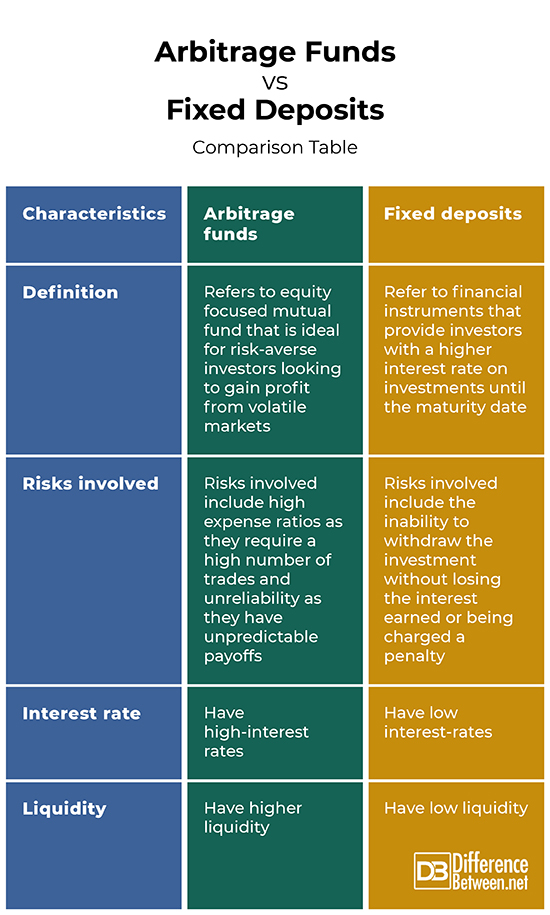Difference Between Arbitrage Funds and Fixed Deposits
The need for investments and saving for a rainy day cannot be overemphasized. While the future remains unpredictable, people can only do much by making sure they save and make sound investments while at it. There are many types of investments ranging from long term to short term, and risky to less risky investments. An investor’s choice on the type of investment is purely based on how long he can wait to recoup the investment amount and the levels of risks involved. Arbitrage funds and fixed deposits are some of the most common investment options.

Arbitrage Funds
This is equity focused mutual fund that is ideal for risk-averse investors looking to gain profit from volatile markets. Although they carry less risk, investors should study the market to determine whether the investment suits their portfolio.
Common in the cash and futures markets, these funds exploit the price differences in funds that should have the same price. As such, an investor purchases stocks in the cash market and sells the interest in the futures market, although the differences between the stock prices is usually small. To cover for the small margins, arbitrage funds must trade a large number of to make significant gains.
Arbitrage funds may also be traded on different exchanges that have price differences for the same stock. An investor can hence buy a stock at a lower price and immediately sell it at a higher price.
Benefits of arbitrage funds include;
- It carries less risk as security is bought and sold at the same time which makes it low risk tolerant
- They can flourish when the market is highly volatile
- They are taxed as equity funds which is lower compared to the ordinary income tax rate
On the other hand, disadvantages of arbitrage funds include;
- The expense ratios can be high as they require a high number of trades
- They are not reliable as they have unpredictable payoffs

Fixed Deposits
Also referred to as time deposits, these are financial instruments that provide investors with a higher interest rate on investments until the maturity date. They are sold by banks, credit unions or thrift institutions. The higher interest rates compensate for the low liquidity. Also, they can have a maturity between one week to five years but can not be redeemed earlier. However, investors can not withdraw or terminate the investment without the risk of a penalty.
Fixed deposits appeal to low risk and conservative investors as they are extremely safe
Advantages of fixed deposits include
- Have a fixed interest rate over the investment period
- They have minimal risks
- Have a high-interest rate compared to other investment options
- They do not have a fixed deposit amount
However, they have disadvantages including:
- In case of withdrawal, investors risk losing the interest earned or being charged a penalty
- Although they have higher interest rates, they do not consider rising inflation
Similarities between Arbitrage funds and Fixed deposits
- Both are low-risk types of investments
Differences between Arbitrage funds and Fixed deposits
Definition
Arbitrage funds refer to equity focused mutual fund that is ideal for risk-averse investors looking to gain profit from volatile markets. On the other hand, fixed deposits refer to financial instruments that provide investors with a higher interest rate on investments until the maturity date.
Risks involved
Risks involved in arbitrage funds include high expense ratios as they require a high number of trades and unreliability as they have unpredictable payoffs. On the other hand, the risks involved in fixed deposits include the inability to withdraw the investment without losing the interest earned or being charged a penalty.
Interest rate
While arbitrage funds have high-interest rates, fixed deposits have low-interest rates.
Liquidity
Arbitrage funds have higher liquidity. On the other hand, fixed deposits have low liquidity.
Arbitrage funds vs. Fixed deposits: Comparison Table

Summary of Arbitrage funds vs. Fixed deposits
Arbitrage funds refer to equity-focused mutual fund that is ideal for risk-averse investors looking to gain profit from volatile markets. They have high interest rates and higher liquidity. On the other hand, fixed deposits refer to financial instruments that provide investors with a higher interest rate on investments until the maturity date. Investors should be keen before committing to fixed deposits as they risk the inability to withdraw the investment without losing the interest earned or being charged a penalty. Both are, however, low-risk types of investments.
- Difference Between Profit Center and Investment Center - July 2, 2022
- Difference Between Anti-Trust and Anti-Competition - June 6, 2022
- Difference Between Stocktaking and Stock Control - June 6, 2022
Search DifferenceBetween.net :
Leave a Response
References :
[0]Rouah F & Gregoriou G. Hedge Funds: Strategies, Risk Assessment, and Returns. Beard Books, 2003. https://books.google.co.ke/books?id=GmhvazZJCxYC&pg=PA72&dq=Arbitrage+funds&hl=en&sa=X&ved=2ahUKEwi2k7y68JPrAhWkx4UKHUGTDx4Q6AEwAXoECAEQAg#v=onepage&q=Arbitrage%20funds&f=false
[1]Yadnya Investments. 108 Questions & Answers on Mutual Funds & SIP. Notion Press, 2017. https://books.google.co.ke/books?id=eIcxDwAAQBAJ&pg=PT64&dq=Difference+between+Arbitrage+funds+and+Fixed+deposits&hl=en&sa=X&ved=2ahUKEwijt6na75PrAhUMExoKHcPUDYIQ6AEwAHoECAYQAg#v=onepage&q=Difference%20between%20Arbitrage%20funds%20and%20Fixed%20deposits&f=false
[2]Nico Swart. Personal Financial Management. Juta and Company Ltd, 2004. https://books.google.co.ke/books?id=d08rxE8k6NMC&pg=PA338&dq=fixed+deposits&hl=en&sa=X&ved=2ahUKEwjLhrvU8JPrAhUhzIUKHQ9nBr8Q6AEwAXoECAYQAg#v=onepage&q=fixed%20deposits&f=false
[3]Image credit: https://myfinancereviews.files.wordpress.com/2019/12/pie-chart-percent-wo.jpg?w=1632
[4]Image credit: https://p0.pikist.com/photos/26/619/banking-bill-business-cash-currency-finance-money-saving-new.jpg
